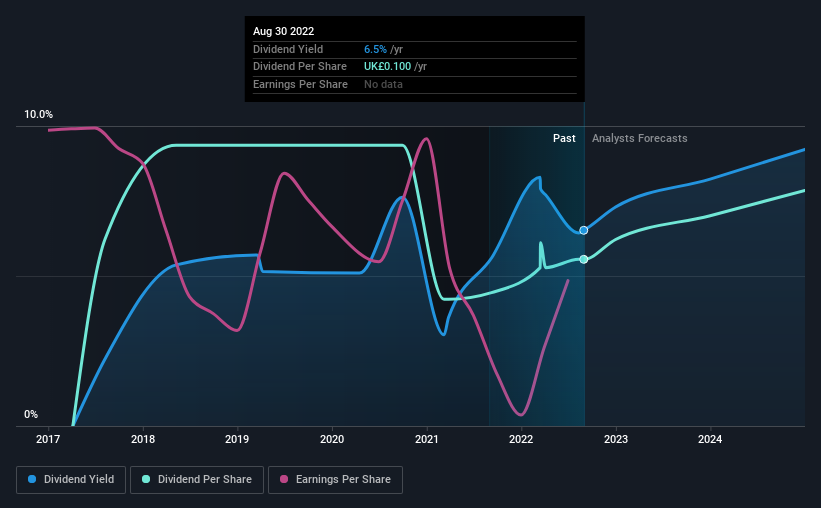- United Kingdom
- /
- Capital Markets
- /
- LSE:TCAP
TP ICAP Group (LON:TCAP) Will Pay A Larger Dividend Than Last Year At £0.045

The board of TP ICAP Group PLC (LON:TCAP) has announced that the dividend on 4th of November will be increased to £0.045, which will be 13% higher than last year's payment of £0.04 which covered the same period. This will take the dividend yield to an attractive 6.5%, providing a nice boost to shareholder returns.
Check out our latest analysis for TP ICAP Group
TP ICAP Group's Payment Has Solid Earnings Coverage
Impressive dividend yields are good, but this doesn't matter much if the payments can't be sustained. Based on the last payment, the company wasn't making enough to cover what it was paying to shareholders. Without profits and cash flows increasing, it would be difficult for the company to continue paying the dividend at this level.
Over the next year, EPS is forecast to expand by 133.9%. Under the assumption that the dividend will continue along recent trends, we think the payout ratio could be 41% which would be quite comfortable going to take the dividend forward.

TP ICAP Group's Dividend Has Lacked Consistency
It's comforting to see that TP ICAP Group has been paying a dividend for a number of years now, however it has been cut at least once in that time. If the company cuts once, it definitely isn't argument against the possibility of it cutting in the future. Since 2017, the annual payment back then was £0.112, compared to the most recent full-year payment of £0.10. This works out to be a decline of approximately 2.2% per year over that time. A company that decreases its dividend over time generally isn't what we are looking for.
The Dividend Has Limited Growth Potential
With a relatively unstable dividend, it's even more important to evaluate if earnings per share is growing, which could point to a growing dividend in the future. TP ICAP Group's EPS has fallen by approximately 13% per year during the past five years. This steep decline can indicate that the business is going through a tough time, which could constrain its ability to pay a larger dividend each year in the future. It's not all bad news though, as the earnings are predicted to rise over the next 12 months - we would just be a bit cautious until this becomes a long term trend.
TP ICAP Group's Dividend Doesn't Look Great
Overall, while the dividend being raised can be good, there are some concerns about its long term sustainability. The company's earnings aren't high enough to be making such big distributions, and it isn't backed up by strong growth or consistency either. Overall, this doesn't get us very excited from an income standpoint.
It's important to note that companies having a consistent dividend policy will generate greater investor confidence than those having an erratic one. At the same time, there are other factors our readers should be conscious of before pouring capital into a stock. Just as an example, we've come across 2 warning signs for TP ICAP Group you should be aware of, and 1 of them doesn't sit too well with us. If you are a dividend investor, you might also want to look at our curated list of high yield dividend stocks.
Valuation is complex, but we're here to simplify it.
Discover if TP ICAP Group might be undervalued or overvalued with our detailed analysis, featuring fair value estimates, potential risks, dividends, insider trades, and its financial condition.
Access Free AnalysisHave feedback on this article? Concerned about the content? Get in touch with us directly. Alternatively, email editorial-team (at) simplywallst.com.
This article by Simply Wall St is general in nature. We provide commentary based on historical data and analyst forecasts only using an unbiased methodology and our articles are not intended to be financial advice. It does not constitute a recommendation to buy or sell any stock, and does not take account of your objectives, or your financial situation. We aim to bring you long-term focused analysis driven by fundamental data. Note that our analysis may not factor in the latest price-sensitive company announcements or qualitative material. Simply Wall St has no position in any stocks mentioned.
About LSE:TCAP
TP ICAP Group
Provides intermediary services, contextual insights, trade execution, pre-trade and settlement services, and data-led solutions in Europe, the Middle East, Africa, the Americas, and the Asia Pacific.
Good value with proven track record and pays a dividend.
Similar Companies
Market Insights
Community Narratives



